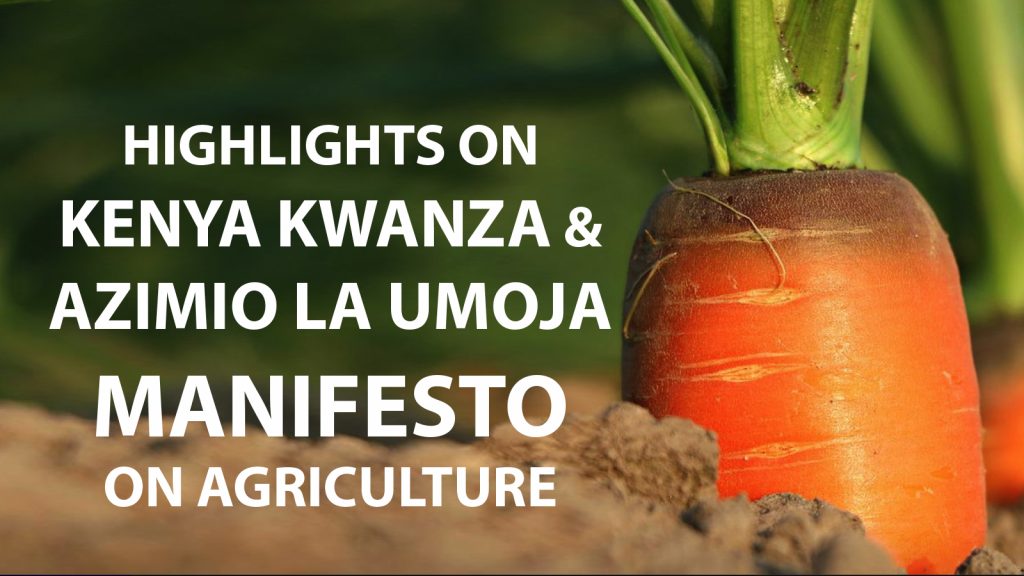Kenya Kwanza Manifesto on agriculture
The worlds’ population is growing at an alarming rate making it a near impossible fete to meet its food demand. The situation is dire in Africa with the African Union encouraging its members to invest in agriculture, which has only been viewed as a solution to hunger. It (AU) requires signatories of the Comprehensive Africa Agriculture Development Programme (CAADP) to inject at least 10% of their budget in to agriculture for economic development.
As a signatory, Kenya has recognized agriculture, placing it as a big component of the Big Agenda 4, as a driver of economic growth. In other words the focus on agriculture has increased, better policies have been put in place and more funds have been allocated to agriculture sector. This is geared towards improved agricultural production, high income for farmers, job creation and food security.
However, much more need to be done and with the political will and a peaceful and secure
environment, the agricultural sector can realize sustainable growth. Without a doubt, agriculture is deemed as the next frontier, a fact our leaders on campaign trail have come to embrace going by their manifesto.
With our elections coming soon, the farmers are anxious to know what is contained in the manifesto launch sometime back on how the sector is going to be improved.
Through their manifesto, the competing parties have outlined how they are going to effect change in the agricultural sector for the betterment of all stakeholders. Here are some highlights of the intentions of Kenya Kwanza Manifest in agriculture and Azimio at a glance.
Kenya Kwanza Manifesto on Agriculture
The Kenya Kwanza in its manifesto has identified agriculture as a means of reducing the cost of living by increasing income of farmers. It plans to implement a Fertilizer Subsidy Programme. Generally when there is low supply, the demand goes up. Likewise, the prices go up. Consequently, there is need for balance between better (high) income for the farmer and better (low) prices for the consumer. Farm input prices will be reduced to a maximum of ksh.15000 per acre. This is achievable with low input prices and good farming practices (certified seeds, fertilizer, agro-chemicals) with the end results being high productivity.
A revolving fund will also be created to support the targeted 2 million farmers. 12 billion per year for the next 5 years will be allocated for extension services. The farmers will be equipped with latest information to aid production.
Agriculture has quick returns hence the need to make available and affordable feed supplements for livestock for improved milk production, therefore improved income for the farmer. Livestock will insured and farmers contracted to ensure guaranteed outcome.
In addition, dependency on basic food imports will be reduced by 30% and the tea value chain will be boosted in terms of blending and branding. Ksh.250 billion will be committed between the years 2023 to 2027.
In short, agriculture is the most competitive sector in the country and has a multiplier effect on other sectors and requires quick action, says UDA Presidential candidate, Dr. William S. Ruto. He was speaking during a one-on-one interview recently at Serena Hotel Nairobi.
Azimio la Umoja Manifesto on Agriculture
Azimio believes that agriculture can create wealth through industrialization apart from feeding the Nation. Agriculture can more create jobs and income for farmers. Moreover it is also a foreign exchange earner through exports and provides raw materials to agro processing industry. In other words it is the backbone of our economy and more needs to be done to improve productivity.
It is important that the challenges contributing to low productivity must be addressed to stop Kenya being a net importer of food by reducing farm inputs prices, increase acreage of arable land production, modernization through mechanization to reduce cost of production, enable farmers to access affordable credit and encourage youths to take up farming through technological solutions. More agro processing factories will be opened up in the counties to add value for export. Coconut
farming will be introduced as a cash crop and beverages processed as value addition. Lastly, maize production will be expanded to stop importation.
These were said by Peter Munya and the Azimio Presidential candidate Raila Odinga during the launch of the Azimio manifesto.
In conclusion
We need to invest as a country in agriculture. Access and affordability of farm inputs, farm
implements and financial credit must be enhanced. Farmers should be sensitized on good farming practices. More extension officers are required to assist farmers. Equally important is research which should play an important role in up scaling agricultural production. Lastly farmers should embrace the use of technology (innovations) for sustainable agriculture.
